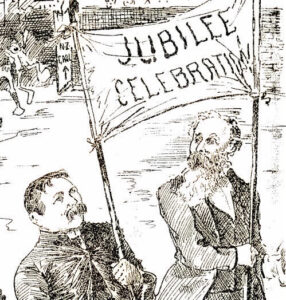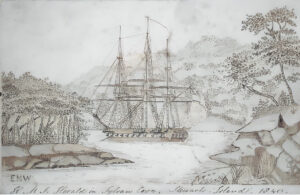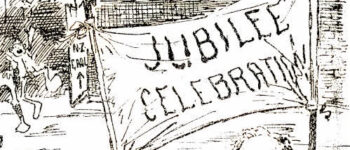1890: Celebration of the Colony’s Jubilee
January 29, 2023
By AHNZ
 Today in history, 29 January, 1890, we celebrated our first 50 years of New Zealand history. Auckland, in particular, poured time and effort into four days of festivities. Maoris were in attendance too although, back then, their name for our country was Nui Tireni and Aotearoa had never been contemplated. However the interesting thing about this anniversary day that would startle the modern mind is that it was not at all set from the signing of the Treaty of Waitangi on 6 February.
Today in history, 29 January, 1890, we celebrated our first 50 years of New Zealand history. Auckland, in particular, poured time and effort into four days of festivities. Maoris were in attendance too although, back then, their name for our country was Nui Tireni and Aotearoa had never been contemplated. However the interesting thing about this anniversary day that would startle the modern mind is that it was not at all set from the signing of the Treaty of Waitangi on 6 February.
New Zealanders of 1890 knew better than ourselves when the colony got started because it was their lived experience. For example, Daniel Pollen witnessed the coming of Hobson and the signing of the Treaty and was still alive (77yo) and present for the Jubilee. Also, William Colenso, who attended Napier’s Jubilee service at the ripe old age of 79 was present himself at the Bay of Islands when William Hobson sailed in to pronounce himself Lieutenant Governor of New Zealand.¹ The people of Wellington remembered the 50th too but insisted on the 22nd of January since that was the date that had the most meaning for them. In Christchurch and Dunedin there was a public holiday. For the most part it was New Zealand’s Jubilee and Auckland’s Celebration. Ref. 1840: Wellington Anniversary, AHNZ
There were street decorations, parades from all sorts of community groups, a message from Queen Victoria, speeches, horse racing, illuminations, Maori canoe races, swimming carnival, an intercolonial cricket match with New South Wales, a ball at the Northern Club, yachting, rowing, gymnastics, bicycle races, running races, obsticle courses, hakas, and a horticultural show. A special Ode to Zelandia song was composed telling the history of the young nation. John Thurston, Governor of Fiji, appeared. Rewi Maniapoto of the Waikato came. Charles Wynn-Carington, Governor of New South Wales, attended too and perhaps helped smooth the way for New Zealand to join the Federation of Australia later that year (we did not.)
The religious community created an initiative to have the Jubilee Celebration Committee cooperate with them to give pardons to all first offenders incarcerated in New Zealand jails.² This idea was downright Biblical but, then, so was the idea of a ‘jubilee’ after 50 years which New Zealanders were not too familiar with and needed to have it explained. Apart from Queen Victoria’s recent “jubilee” it was only known from the book of Leviticus but it was a word that would enter our lexicon now and have many occasions for future use.
“A PAMPHLET Containing THE FIRST FIFTY YEARS OF NEW ZEALAND HISTORY, Also, Full Reports of the EVENTS OF THE FOUR JUBILEE DAYS. Contents: The Early Days of the Colony—Early Communication with New Zealand—First Settlers The Maori Immigration— of the Maori Race— Cannibalism— Exterminating Wars—The Whalers—The Missionaries Zealand a British Colony—The Settlement of Auckland— The Pilgrim Fathers-Early Struggles-After Fifty Years…” – NZ Herald (1890,) Papers Past
“The Jubilee procession, or demonstration, proposed to be held on tho morning of January 29th, ia being favourably taken up by the various friendly and trade societies, and promises to be a great success. The city and suburban fire brigades, and also the Salvage Corps, have signified their willingness to take part, and favourable replies have also been received from various branches of the Oddfellows, Foresters, Orangemen, the Seamen’s Union, and various other trade societies….
“The most attractive piece to be performed is a ” Jubilee Ode to Zealandia,” written by Mr M. May, of Ponsonby, and set to music by Mr J. H. Phillpot, comprising tenor and bass solos, quartet and chorus…” – New Zealand Jubilee, Auckalnd Celebration. Auckland Star (1890,) Papers Past
“During my stay in New Zealand, the anniversary o the colonisation of the North Island occurred, and great preparations had been made for a worthy celebration…everyone who had time and an apartment would go there…I checked into one of the hotels…Of the numerous rooms, some were occupied by whites , but perhaps the majority of civilised Maori, among whom was King Tawhiao’s brother, and oldgrey-haired Maori man, wearing anything but royal garb. Races, contests on velocipedes and competitive swimming succeeded each other, and parties went through the city to the sound of games and flying flags.” – Pa Forskningsfard, Fristedt (1891)
 In 2017 the New Zealand Herald took a shot at the public for having “little clue about the details of the Treaty of Waitangi, including what year the historic document was signed.” But why should we? For most of our history the rituals at Waitangi were unimportant and a legal nullity. New Zealanders, in not knowing, had not lost contact with the past at all but rather had not been successfully propagandised. The first Waitangi Day public holiday was in 1977 as a product of historical revisionism. Ref. 1970s: Kiwis have no idea when the Treaty of Waitangi was signed, AHNZ
In 2017 the New Zealand Herald took a shot at the public for having “little clue about the details of the Treaty of Waitangi, including what year the historic document was signed.” But why should we? For most of our history the rituals at Waitangi were unimportant and a legal nullity. New Zealanders, in not knowing, had not lost contact with the past at all but rather had not been successfully propagandised. The first Waitangi Day public holiday was in 1977 as a product of historical revisionism. Ref. 1970s: Kiwis have no idea when the Treaty of Waitangi was signed, AHNZ
Clearly the first generations of New Zealanders did not place much importance on ‘Waitangi Day’ and it is our own modern social construct. What mattered more was William Hobson’s proclamation by which Crown control was established. The Treaty was simply performed for Public Relations reasons since the legal and sovereignty part of the job was already in the bag. Interesting, though, that the 50th Jubilee kicked off on the day Hobson arrived in New Zealand. He did not actually set foot on New Zealand soil and issue his proclamations until January 30th.
—
1 Ref. The Jubilee, South Canterbury Times (1890,) Papers Past
2 Ref. Auckland Star (1890,) Papers Past
Image ref. Cartoon making fun of priests seeking to pardon convicted criminals to mark the Jubilee. Ref Observer (1890,) Papers Past
Image ref. Cover of New Zealand’s Jubilee 1840-1890 (1890,) NZ Herald and NZ Weekly News, Trove, National Library of Australia
Image ref. HMS Herald in 1840, at Stewart Island. Alexander Turnbull Library, enhanced by AHNZ (2024)
7 thoughts on "1890: Celebration of the Colony’s Jubilee"
Leave a Reply
 Like Comment Share
Like Comment Share






As Australia recently celebrated its national day, I found myself reflecting once again on the joy and unity that a similar day could bring to New Zealand. With three adult children who are Australians and one who was born on Australia Day, I have a strong connection to that celebration. This only reinforces my belief that we, too, should have a day dedicated to celebrating our national identity. [edit 30/1/25]
I have been advocating among friends and all who will listen, for New Zealand to establish a national day—a day for all New Zealanders to come together and celebrate what it truly means to be a Kiwi. A day free from political grandstanding, focused purely on unity, pride born out of being a kiwi, and shared identity.
Right now, what do we have that even comes close to this? Nothing. Some might argue that Waitangi Day serves this purpose—after all, that was the response I received from a government minister last year. (She’s no longer a minister, by the way.)
But a true national day would be something different. It would be a celebration for all New Zealanders, including those who have recently been granted citizenship, giving them the chance to join with Kiwis—young and old—in a moment of unity and national pride.
Come on, let us—the everyday citizens—get behind this and push the powers that be to yield to what we, the people of New Zealand, want. This is about us! Not what the suits in Wellington dictate, nor should we need the permission of any ethnic group for such an event. For goodness’ sake, Kiwis, we’re New Zealanders after all! Surely it is time to stand together and celebrate that?
I returned to New Zealand three years ago after 30 years abroad, and I’ve found a society that certainly feels deeply fragmented and lacking leadership (thanks in no small way to successive governments, it seems they would rather have us this way than a proud unified nation.) A day like this could be a powerful step toward fostering unity, encouraging thoughtfulness, and above all, celebrating the joy of being a proud Kiwi.
P.S. I understand that a similar initiative was attempted in the early 1970s but was met with opposition from certain groups. As a result, their opinion was endorsed, and we once again missed a great opportunity. Come on New Zealand let’s not be known as a country that never misses their opportunity to miss an opportunity!
Right you are. Our ancestral generations had such a day but we gave it up.
We could petition parliament
We, the undersigned, respectfully petition the Parliament of New Zealand to establish a national day to celebrate New Zealand’s identity.
We believe that having a dedicated national day will foster unity, honour, and a sense of shared identity among all New Zealanders. It will provide an opportunity for New Zealanders to come together, celebrate their heritage, and reflect on what it means to be a New Zealander (not Kiwi)
This national day should celebrate our country’s rich heritage, honouring our ancestors who built the nation’s infrastructure. It should promote unity, confidence, and a sense of belonging among all individuals , upholding the rights and freedoms enshrined in the 1688 Bill of Rights.
We urge the Parliament to take the necessary steps to establish this national day, consistent with our values and ancient rights.
Why ask permission from politicians to celebrate your identity?
Hi Dianne,
Great idea. However, you’re talking about reflecting on the past, and quite frankly, isn’t that part of the problem we have now? Language like:
“This national day should celebrate our country’s rich heritage, honouring our ancestors who built the nation’s infrastructure… upholding the rights and freedoms enshrined in the 1688 Bill of Rights.”
The very mention of the Bill of Rights and specific dates—such language is likely to be seen as inflammatory by the very groups that want us to be forever stuck in the past. That seems to be their power base. Part of the issue, as I see it, is that New Zealand seems to be forever milling around in the past. It’s hard to move forward when one is constantly being ‘held’ to the past.
Let’s avoid framing this from the angle of ‘rights’ and instead focus on coming together, in the same spirit as the 1974 Commonwealth Games song—a true celebration of unity.
The last thing we need is to make this a political issue—that should be avoided at all costs. I believe it’s far more important to at least try to get all ethnicities on board with this. Now that would be a major achievement.
I’m talking about the here and now, while still acknowledging past achievements. New Zealand Day could also double as a ceremony for those who have chosen to become Kiwis. Imagine morning ceremonies all around the country, followed by BBQs and other activities.
Personally, I would like to celebrate what it means to be a ‘Kiwi,’ along with everything that actually entails.
So, what does it really mean to be a Kiwi, a New Zealander? Off the top of my head:
Friendly
Laid-back
Resilient
Thoroughly reliable
Generous
Independent
Adventurous
Easygoing
Down-to-earth
Resourceful
Community-minded
Well, these are but just my thoughts.
You should read the book of Jubilees, it breaks everything down into timelines.
Puts the rest of the bible into a context, with Enoch and the nephilim.
Most people skip over that weird passage in Genesis about the sons f God taking wives from the daughters of me, and the race they spawned.
Now probably you are safe in your athiesm, university educated, but a re-read of the bible presents a Tolkeinish view of the battle between Man, and hybrid creatures. All the ‘genocide’ referred to in the OT was about these creatures.
Sheds a new light on historical events, and there’s still plenty of secret societies keeping up the worship of these entities.
Almost lost over the centuries, the Book of Jubilees was retrieved from the Ethiopic language, translated into English by R. H. Charles, and was recently found among the Dead Sea Scrolls. The Book of Jubilees is also called the Little Genesis, Book of Divisions, and the Apocalypse of Moses. It repeats the events of Genesis and Exodus from Creation to the Exodus of the Children of Israel from Egypt. It recounts the events in sets of jubilees (sets of 49 years) and gives additional details such as the fall of the angels, and the creation and destruction of the Nephilim. It also mentions the three classes of pre-flood Nephilim. It details the fact that one-tenth of their disembodied spirits would remain on earth as demons to tempt people and nine-tenths would be chained until the Tribulation Period. Learn what secrets this Dead Sea Scroll holds. Compare the mysterious Qumran calendar with that of the Bible to learn more about biblical prophecies. The commentary is written from a fundamentalist Christian perspective. Brought to you by Biblefacts Ministries, biblefacts.org
My question to you is, why on earth would I read that? Second question: What does what I wrote have to do with your ‘so-called’ interpretation of biblical history?